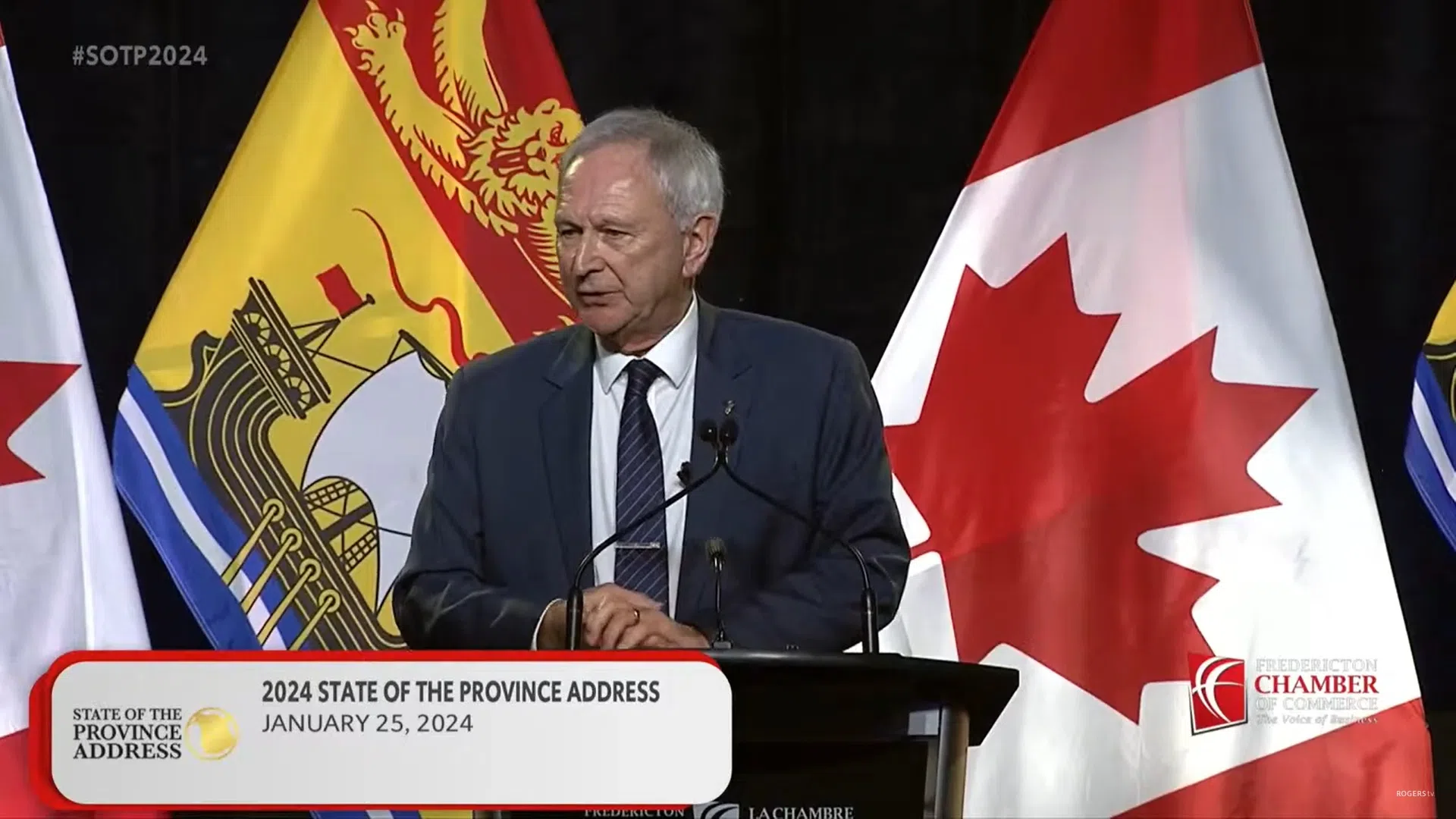New Brunswick is rolling out a new “affordability measure” the premier says will help lower-income workers.
Blaine Higgs unveiled the $79-million initiative Thursday night during his annual State of the Province address, which was broadcast on Rogers tv.
“This is a one-time payment of $300 for families with a net income of $70,000 or less and could benefit around 250,000 families,” Higgs told a crowd of business leaders gathered in Fredericton.
No further details about the benefit, including when the money may start rolling out, were released.
The premier focused on several topics during his 50-minute address, including housing, education, growth, affordability. and health care.
“We are in a period of tremendous growth, and while it can be exciting to see so much development and interest in our province, it’s also been difficult managing that growth with the impact this is having on housing, health care, and schools,” said Higgs.
“We are investing more than ever but the reality is that our growth has come very quickly, and we are introducing major shifts that take time.”
Higgs spent the bulk of his time talking about the health care system and the improvements he said have been made under his leadership.
That includes hiring 40 per cent more nurse practitioners, increasing the roles of paramedics and pharmacists, and replacing the health authority boards.
The premier said while his government has been making record investments in health care, money alone will not fix the issues.
“The problem we are facing is that our health care system is not a system at all. It is a patchwork of services offered by different organizations and providers, often with mandates that are unclear to New Brunswickers,” he said.
“To put the patient first, we are going to need higher levels of collaboration and innovative approaches. To fully harness all of the opportunities, we’ll need even stronger management of the system as a whole.”
Higgs unveiled the launch of the new MyHealthNB app, which will allow New Brunswickers to see test results, vaccine records, and eventually diagnostic imaging and ER wait times.
The premier said his government is also looking to guarantee that patients can receive specific procedures within an established benchmark if they are willing to travel.
On the topic of homelessness, which Higgs said is “tied to the rising levels of mental health and addiction,” the premier said his government has taken several steps to deal with the crisis near-term.
He added the province must be “more strategic about support services and recovery” over the long term, which includes addiction rehabilitation.
Higgs reiterated his government’s plan to double the capacity for adult addiction rehabilitation, starting with 50 new beds. Details have not been released about where the beds will be located, but the government has said the four-to-six-month program will treat 100 to 140 people each year.
“Our goal is to help individuals re-establish ties with their families and provide social integration, skills and tools to help them cope with everyday life,” he said.
The premier also used his annual address to take aim at the federal Liberals, criticizing their energy strategy and recent decision to cap student visas.
Higgs touted the recently released provincial energy strategy as “excellent” and “ambitious” for New Brunswick while continuing to advocate for developing a natural gas industry in the province.
“The impact would be transformational for our province, First Nations, our residents and the world. It could easily be the solution to our current affordability woes, with royalties that benefit every New Brunswicker,” he said.
When it comes to the international student permit cap, Higgs said New Brunswick should not be “swept up in national policies that aren’t right for us.”
“Just like the carbon tax, we are now seeing solutions applied everywhere that are really targeting issues in large urban centres, and it doesn’t make sense,” he said.
“If this policy goes forward, we will pay the price for problems that exist in other parts of the country, and set our province back on enrollment growth, capable new talent, while shrinking the labour market.”
New Brunswick’s labour market needs workers and the province’s post-secondary enrollment still has room to grow, he said.
Meanwhile, the premier said his government is also committed to closing the gap in basic reading and math scores, fixing classroom composition issues, and creating a learning environment that is “safe and welcoming” for students and teachers.
“We’ve taken many steps to reshape the services New Brunswickers depend on every day,” he said. “We have a firm grip on the tough issues, and we’re not shying away,”







